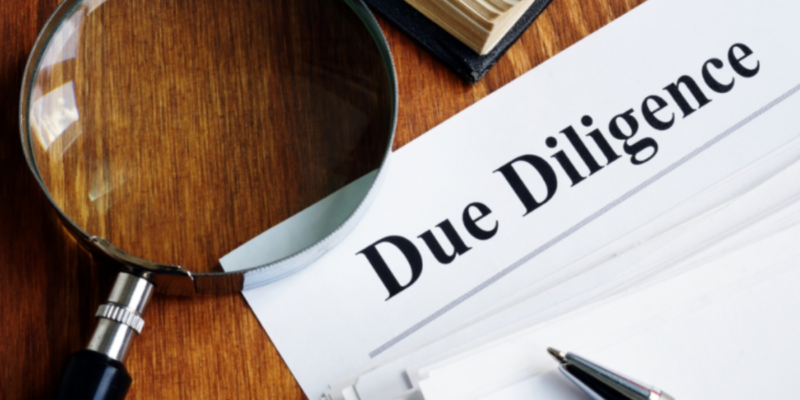Due Diligence in Property Buying – A Comprehensive Guide & Checklist!
August 30th, 2024

Due diligence in real estate property buying involves thorough research and assessment of a property’s legal, financial, and physical aspects – to take informed, risk-free investment decisions.
Due diligence in real estate is a thorough investigation conducted by buyers or investors before purchasing a property. This essential process involves examining legal documentation, financial records, property condition, and market analysis to minimise risks and take informed decisions.Due diligence in real estate helps investors understand a property’s value, potential challenges, and prospects.
This article delves into the significance of due diligence in real estate and the key factors involved to guide you in taking smart real estate investment decisions
Table of Contents
Understanding Due Diligence in Real Estate
-
Purpose of Due Diligence
The primary purpose of due diligence is to provide clarity and security to the buyer, minimising the chance of future disputes or financial loss. This process is vital to ensure that all potential risks are identified, legalities are met, and the property’s value is accurately assessed.
-
Pre-purchase Due Diligence
Extensive research is conducted before signing a property deal. The buyer examines the property’s legal records – such as title deeds, encumbrance certificates, and clearances – to ensure no pending legal issues. A thorough property condition assessment is also conducted, including structural inspection, survey of amenities, and review of zoning regulations. Additionally, the financial aspects – including taxation, loans, and market value – are evaluated to determine whether the property aligns with the buyer’s investment goals.
-
Post-purchase Due Diligence
Though often overlooked, post-purchase due diligence is essential for securing long-term property value and compliance. This stage involves verifying that the transaction has been properly documented, updating the title with local authorities, and ensuring all taxes, utility accounts, & contracts are transferred or set up correctly. Buyers may also conduct further inspections to ensure any contractual obligations, such as repairs or upgrades, have been fulfilled.
Read More: Buying a Second Home: Step-by-Step Guide for a Smart Investment
Key Components of Real Estate Due Diligence
-
Property Inspection
It is a crucial part of due diligence in real estate, ensuring buyers are fully aware of the property’s condition before finalising a purchase. This process helps identify hidden issues that could lead to costly repairs or health hazards.
Physical Inspection: This involves a thorough assessment of the property’s structure and systems, including the foundation, roofing, plumbing, and electrical work. Identifying any structural deficiencies or necessary repairs helps you ensure the property meets safety and quality standards. This step in due diligence in real estate allows you to negotiate better or avoid properties needing significant post-purchase investment.
Pest and Environmental Inspections: These inspections focus on uncovering issues like termite infestations or mould, which could pose serious health risks or require expensive remediation. Environmental checks also assess hazards like soil contamination that might affect the property’s value.
-
Legal Due Diligence
In real estate transactions, legal due diligence is essential to avoid potential legal complications and ensure a smooth purchase.
Title Deed: Due diligence in real estate involves several critical steps, starting with a thorough title search. This process verifies the authenticity of the title deed, ensuring that the seller has legal ownership of the property and that there are no liens, encumbrances, or unpaid dues that could jeopardise the transaction.
Zoning and Land Use Regulations: Another crucial aspect of due diligence is verifying compliance with local zoning and land use regulations. This step ensures that the property is within the correct zoning category and adheres to local laws, which is vital for the intended use of the property.
Review of Contracts and Agreements: Lastly, a meticulous review of all existing contracts and agreements related to the property is necessary. This includes checking for any encumbrance certificates, necessary approvals, and permits to confirm the legal standing of the property.
-
Financial Due Diligence
When conducting due diligence in real estate, one of the key aspects to consider is the financial health of the property, especially if it is an investment.
Verification of Financial Records: Begin by verifying financial records, which includes reviewing past income and expenses – for example monthly rents and costs of repair. This step helps to assess whether the property has been financially viable and can generate the expected returns.
Valuation and Market Analysis: Next, perform a thorough valuation and market analysis. Estimating the property’s current value is crucial for determining if the asking price is fair. Additionally, analysing market trends helps you predict future property performance and potential appreciation, ensuring a sound investment.
Assessment of Property Taxes: Finally, assess the property taxes by checking current and past obligations. Understanding the tax history can reveal any outstanding liabilities that could affect the transaction. It also helps in budgeting for future expenses, ensuring there are no surprises after the purchase.
-
Neighbourhood and Community Assessment
Understanding the local market conditions of the neighbourhood is crucial. This involves analysing property values, trends, and demand within the area. By gaining insights into the local real estate market, you can assess whether the property is priced fairly and predict its potential for appreciation.
Community Amenities and Infrastructure: Next, evaluate the community amenities and infrastructure. Consider the availability of essential services like schools, hospitals, shopping centres, and public transport. Proximity to these facilities enhances the quality of life and contributes to the property’s long-term value.
Crime Rates and Safety: Safety is another vital factor in the due diligence process. Research crime rates and safety concerns within the neighbourhood. Understanding the area’s security level ensures peace of mind and protects your investment.
Conducting Due Diligence
Thorough evaluation of a property’s legal, financial, and physical aspects helps you take informed decisions and mitigate potential risks before finalising a purchase.
-
Initial Research
This involves gathering preliminary information about the property – such as its history, ownership details, and market value. Imagine you are eyeing a 10-year old apartment in a well-established neighbourhood. During your initial research, you discover that the property has changed hands multiple times in the last few years. This could be a red flag indicating underlying issues.
-
Hiring Professionals
Next, engage the right professionals to assist with the due diligence process. This includes hiring experienced real estate consultants, lawyers, inspectors, and appraisers. These experts bring specialised knowledge that is crucial for uncovering potential issues, from legal complications to structural problems.
For example, a thorough inspection might reveal a hidden mould issue that could have led to significant health and financial problems down the road. Hiring the right team ensures you do not miss critical details.
-
Reviewing Reports and Findings
Analyse inspection reports, legal documents, and appraisal values to gain comprehensive understanding of the property’s condition and legal standing. Think of it as putting together pieces of a puzzle – each report adds a piece to the overall picture, helping you see the complete scenario before taking a decision. Missing or overlooking even one piece could result in unexpected challenges.
-
Taking an Informed Decision
Consider whether the findings align with your expectations and investment goals. This step ensures that your due diligence in real estate leads to a sound and confident decision, minimising risks and securing your investment. Imagine after thorough analysis, you discover that while the house is perfect in every way, the local market trend indicates a potential downturn. This insight might prompt you to negotiate a better deal or reconsider your purchase altogether.
Common Pitfalls to Avoid
Avoiding common pitfalls in real estate due diligence is crucial for a smooth transaction. Key mistakes include overlooking inspections, ignoring legal issues, and neglecting financial reviews.
-
Overlooking Inspections
Skipping inspections can lead to costly repairs due to hidden issues like structural damage or pests. Ensure you hire a qualified inspector to thoroughly examine critical areas and consider specialised inspections if needed. Conducting these inspections before finalising any deal is essential.
-
Ignoring Legal Issues
Ignoring legal complications, such as unclear title deeds or zoning violations, can lead to significant troubles. Engage a real estate lawyer to perform a title search, review legal documents, and ensure compliance with zoning laws. This critical step can safeguard your investment.
-
Neglecting Financial Aspects
This can result in overpaying or facing unexpected expenses. Review the property’s financial history, assess market value, and check property tax records. This ensures the property aligns with your budget and investment goals.
Tools and Resources for Due Diligence
Utilising the right tools and resources is essential for effective due diligence in real estate. Leverage online databases, professional services, and checklists to thoroughly assess and evaluate properties.
-
Online Tools and Databases
In the process of due diligence in real estate, online tools and databases play a vital role. Websites offering property records, market analysis, and zoning information provide valuable insights that help you assess a property’s potential. These tools allow for quick and efficient research, giving you a solid foundation before making any decisions. A few examples include 99acres, housing, magicbricks, makaan, and nobroker.
-
Professional Services
Engaging the right professionals is also essential for thorough due diligence. Consider hiring inspectors, appraisers, and lawyers who specialise in real estate. These experts bring in-depth knowledge and experience, ensuring that every aspect of the property, from legal compliance to structural integrity, is carefully evaluated.
-
Checklists
To ensure no detail is overlooked, use comprehensive checklists tailored to different types of due diligence. These checklists can guide you through each step of the process, from initial research to final decision-making, helping you stay organised and thorough.
Due Diligence in Property Buying: A Comprehensive Checklist!
Creating a due diligence checklist for real estate property buying is crucial for ensuring a secure investment. Use this checklist as a guide to navigate the complexities of property buying and ensure a smooth and secure transaction. Here’s a comprehensive checklist tailored for you!
-
Title Deed Verification
- Check Ownership: Ensure the seller has a clear title to the property without any disputes.
- Encumbrance Certificate: Verify that the property is free from any legal dues or mortgages.
- Mother Deed: Review the property’s history to trace ownership.
-
Legal Compliance
- Approval from Local Authorities: Confirm that the property has all necessary approvals from local authorities, including land use, building plans, and occupancy certificates.
- Compliance with Zoning Laws: Ensure the property adheres to local zoning regulations.
- NOC (No Objection Certificates): Obtain NOCs from the municipal corporation, electricity, water, and other relevant authorities.
-
Property Valuation
- Market Value: Compare the property’s price with the prevailing market rates to avoid overpaying.
- Independent Valuation: Consider hiring an independent valuer for an unbiased assessment.
-
Financial Aspects
- Home Loan Eligibility: Check your eligibility for a home loan and the maximum amount you can borrow.
- Hidden Costs: Be aware of additional costs such as registration fees, stamp duty, maintenance charges, and property taxes.
- Down Payment and EMI Calculations: Ensure you have sufficient funds for the down payment and that the EMI is manageable.
-
Builder/Developer Background Check
- Reputation: Investigate the builder’s reputation through reviews, past projects, and customer feedback.
- Litigation History: Verify if there are any ongoing legal disputes involving the builder.
- Project Delivery: Check the builder’s track record for delivering projects on time.
-
Physical Inspection
- Quality of Construction: Inspect the quality of construction, including materials used, finishing, and workmanship.
- Amenities and Facilities: Ensure all promised amenities and facilities are provided.
- Neighborhood and Infrastructure: Assess the surrounding area for essential infrastructure like schools, hospitals, transportation, and shopping centers.
-
Verification of Land Use
- Land Zoning: Confirm that the land is zoned for residential or commercial use as per your needs.
- Land Conversion Certificate: Ensure agricultural land has been legally converted for non-agricultural purposes.
-
Regulatory and Tax Compliance
- Property Taxes: Check if property taxes have been paid up to date.
- GST and Other Taxes: Ensure compliance with applicable taxes such as GST for under-construction properties.
-
Occupancy Certificate
- OC Verification: Ensure the builder has obtained an Occupancy Certificate (OC), which indicates that the property is ready for possession.
-
Agreement and Documentation
- Sale Agreement: Review the sale agreement carefully, ensuring all terms and conditions are clearly stated.
- Power of Attorney: If applicable, ensure the power of attorney is genuine and legally valid.
- Registration: Verify that the property is registered in your name after the transaction.
-
Environmental Compliance
- Environmental Clearances: Ensure the property complies with environmental regulations, especially if located near sensitive zones like forests or coastal areas.
- Green Building Certification: Check if the property has any green certifications like LEED or IGBC.
-
Tenant Verification (if applicable)
- Existing Tenants: If the property is rented out, verify the terms of the lease and the tenant’s background.
- Vacant Possession: Ensure that the property will be vacant upon purchase if that is a condition of the sale.
Tips for Successful Due Diligence
-
Start Early
Begin your due diligence process as soon as you identify a potential property, to allow ample time to address any issues before finalising the purchase.
-
Allocate Sufficient Budget
Set aside a proper budget for inspections, legal reviews, and professional services, to avoid costly mistakes later.
-
Ask the Right Questions
Proactively enquire about the property’s history, legal status, and risks – to ensure you have all the necessary information for an informed decision.
-
Leverage Technology
Use online tools for market analysis, property records, and essential data to enhance efficiency and accuracy in your due diligence.
-
Document Everything
Keep detailed records of all inspections, reports, and communications to provide a clear reference for future decisions and potential disputes.
Read More: Questions to Ask the Developers when Buying an Apartment
Conclusion
This blog has highlighted the essential steps of due diligence in real estate – including legal checks, financial assessment, property inspection, and community evaluation. These elements are crucial for making informed, secure investments.
Start early, allocate a sufficient budget, and engage professionals to navigate the process effectively. Leverage technology and document every detail to avoid common pitfalls. Share your experiences or consult a real estate professional to ensure your next property transaction is successful.
FAQs
1. What is due diligence in real estate?
Due diligence in real estate is a comprehensive investigation of a property before finalising the purchase – to ensure all legal, financial, and physical aspects are in order. This process helps buyers take informed decisions and avoid potential risks.
2. Why is due diligence important when buying real estate?
Due diligence is important when buying real estate as it helps uncover hidden issues, verify property details, and assess risks, ensuring you take an informed decision and avoid unexpected costs or legal problems later.
3. What are the main components of real estate due diligence?
The main components of real estate due diligence are thorough property inspection, legal review, financial assessment, and analysis of the neighbourhood and community.
4. What should be included in a property inspection?
A property inspection should include evaluation of structural integrity, plumbing systems, electrical systems, and checking for any pest or environmental issues that could affect the property.
5. How can I verify the legal status of a property?
You can verify the legal status of a property by conducting title search, reviewing zoning laws, and examining any existing contracts or agreements associated with the property.
6. What financial aspects should I review during due diligence?
Financial aspects that you should review during due diligence are the property's financial records, market analysis, valuation, and current & past property tax obligations.
7. How do I assess the neighbourhood and community?
You can assess the neighbourhood and community by researching local market conditions, evaluating nearby social facilities & infrastructure, examining crime rates & safety through online resources & local visits, and speaking to local residents.
8. What are common pitfalls in real estate due diligence?
Common pitfalls in real estate due diligence are skipping thorough inspections, overlooking legal complications, and failing to conduct a detailed financial review – which can lead to costly issues later.
9. How can I find reliable professionals for due diligence?
You can find reliable professionals for due diligence – like real estate consultants, inspectors, and lawyers – through referrals, online reviews, and by checking their credentials with professional associations.
10. What tools and resources are available for due diligence?
Utilise online tools for property records, market analysis, and legal checks, and hire professional services to ensure a thorough due diligence process.
11. What should I do if issues are found during due diligence?
If you find issues during due diligence, negotiate with the seller for repairs or price adjustments, but walk away from the deal if the problems are too significant.
12. Can due diligence be done after the purchase?
While most due diligence should be completed before negotiating and purchasing, some activities like property management and ensuring compliance can continue after the transaction.










